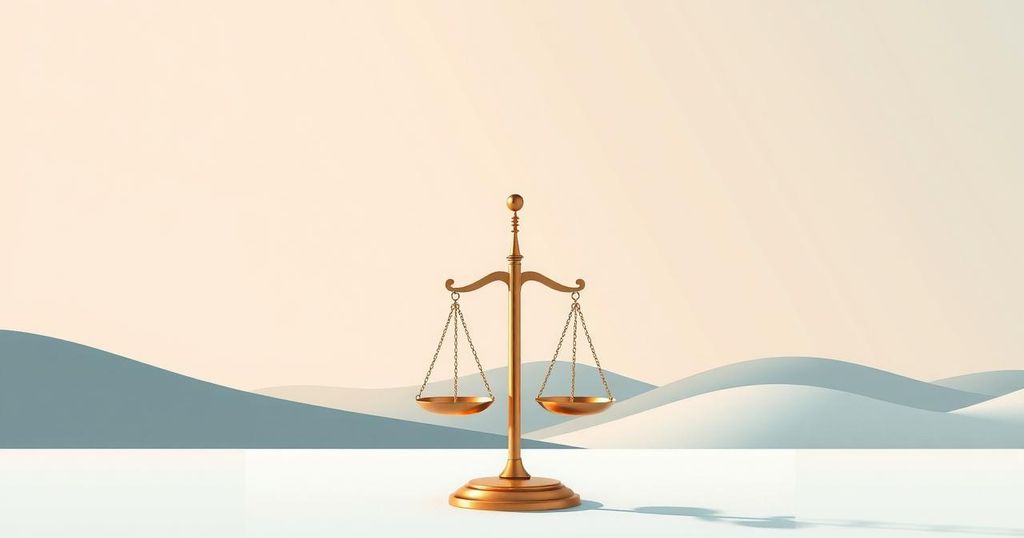At the UN Human Rights Council, NGOs highlighted severe human rights violations in the Tindouf camps in Algeria, emphasizing the worsening humanitarian conditions for residents. Activists reported a lack of security, rampant violence, and exploitation, particularly of children. They called on the international community for urgent intervention and accountability, while Morocco reaffirmed its commitment to human rights during the session.
During the 58th session of the United Nations Human Rights Council in Geneva, numerous non-governmental organizations expressed grave concerns regarding human rights violations in the Tindouf camps of Algeria. The Sahrawi NGO, Promotion of Economic and Social Development (PDES), highlighted the dire humanitarian conditions endured by thousands for almost fifty years, emphasizing their deprivation of basic human rights.
Fatima Ezzahrae Zouhairi, an activist from PDES, reported a significant deterioration of security in the camps, citing increased criminal activities and violence, which exacerbate the suffering of residents. She argued that the lack of security measures from Algeria endangers the population and prevents access to justice or protection.
Zouhairi indicated that the geographical isolation of the camps from international oversight worsens human rights violations, placing vulnerable groups, particularly women and children, at heightened risk of violence and harsh living conditions.
Lemaadla Mohamed Salem Zrug, representing the African Network for Development, Governance, and Human Rights, delivered a stark account of abuses in the camps, including kidnappings, torture, and compulsory child military recruitment. She noted the protection afforded to Polisario officials by Algerian authorities, contributing to a climate of impunity.
El Fadel Braika, a former detainee of the Polisario, condemned the inhumane situation in Tindouf, referencing forced disappearances, torture, and child exploitation. He criticized Algeria for detaining youths attempting to escape the camps, indicating that the plight of Sahrawis remains dire.
Moreover, Judit Segara Casasepare of NGO CIRAC raised alarms about the indoctrination of children in these camps and condemned the “Vacations in Peace” program, alleging it facilitates child trafficking by sending minors abroad without secure conditions for their return. The NGO has urged the UN to launch an investigation into these practices.
Abdelwahab Gain from Africa Culture International also denounced the exploitation of children under a guise of humanitarianism, asserting that many become trafficking victims separated from their families.
PDES has called on the international community to enhance efforts to protect the rights of those in Tindouf. Zouhairi stressed the importance of humanitarian aid free from logistical impediments imposed by Algeria and the Polisario Front, ensuring freedom of movement, and establishing oversight mechanisms to document violations.
The organization further urged immediate actions to remedy the situation, proposing secure humanitarian routes and sustainable solutions for the camp residents. They asked the High Commissioner for Human Rights to send a fact-finding mission to supervise and report on the human rights of those in the camps.
On a broader scale, Morocco reaffirmed its commitment to human rights at the same UN session, with Ambassador Omar Zniber stating that Morocco seeks to build a democratic state rooted in the rule of law. He emphasized Morocco’s proposals for a regional symposium aimed at bolstering legal frameworks regarding forced disappearances.
Support for Morocco’s sovereignty over the Sahara was echoed by forty countries, with Yemen’s Ambassador highlighting Morocco’s proactive engagement with the UN human rights framework. This includes the inauguration of consulates in Dakhla and Laayoune, aimed at enhancing economic cooperation and benefiting local populations.
The recent UN Human Rights Council session illustrated serious human rights violations occurring in the Tindouf camps, as highlighted by various NGOs. Key issues include deteriorating security, impunity for perpetrators, and the exploitation of vulnerable populations, especially children. The international community is urged to take concerted action to protect human rights and provide humanitarian aid, while Morocco continues to assert its commitment to uphold human rights standards.
Original Source: www.moroccoworldnews.com






